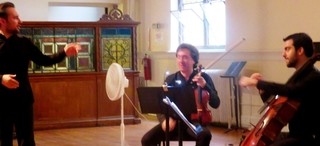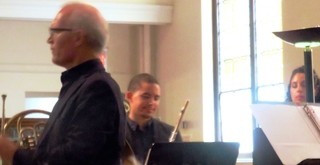|
Back
Four Russian Rarities New York
Good Shepherd Presbyterian Church
09/16/2019 -
Mikhail Ippolitov-Ivanov: An Evening in Georgia for winds and piano, Op. 71
Anatol Liadov: Eight Russian Folk Dances, Op. 58
Sergei Prokofiev: Adagio from Cinderella, Op. 97
Ottorino Respighi: Quintetto in G minor
Nicolai Rimsky-Korsakov: Piano Trio in C minor
Jupiter Chamber Players: Anthony Trionfo (Flute), Roni Gal-Ed (Oboe), Vadim Lando (Clarinet), Gina Ciffoni (Bassoon), Karl Kramer (Horn), Dmitri Berlinsky (Violin), Timotheos Petrin (Cello), Timur Mustakimov (Piano)

T. Mustakimov, D. Berlinsky, T. Petrin (with one of their fans)
(© Samuel A. Dog)
“It is sad, yet joyful, on a silent summer’s night, in a voiceless wood, to hear a Russian song. Here we find unlimited hopeless despair. Here, also is unconquerable strength and the unalterable stamp of Fate.”
Alexei K. Tolstoy (1883-1945)
The most erudite, experienced, and educated music-lover would never be ashamed to admit total ignorance of Jupiter Symphony’s strangely esoteric program yesterday for their opening concert.
Yes, we all knew they were Russian composers (aside from Respighi, though a prized student of Rimsky-Kosakov). We all knew the names (even Liadov became a favorite with his Music Box and tone poems). But who in New York–outside of eclectic specialists–had heard a monochromatic wind quintet from that Titian-colorist Respighi? Who knew that the orchestral genius Rimsky had written a gorgeous Piano Trio?
True, Rimsky had thrown Anatol Liadov out of his classes for being “intolerably lazy.” Yet that composer had written the most scrupulously Russian orchestral Eight Songs, played here as a wind quintet.
Add to this Prokofiev’s own arrangement for cello and piano from Cinderella, and a rare work from Ippolitov-Ivanov, and one had an afternoon concert (with a repeat in the evening) of the well-played and often brilliantly composed rarities.
But one would expect little else from the Jupiter Symphony series, which, this year celebrates half a century of concerts which began under Jens Nygaard and still continues under his wife.
Her artists here were–to say the least–internationally lustrous, coming from Norway (Karl Kramer is one of the world’s finest horn players and a frequent soloist at Jupiter), Israel, Greece, Russia and America.
If their expertise was not always put to good use here, not every work was classically great. Then again, as a French philosopher said, “only mediocrity is always at its best.”

K. Kramer, A. Trionfo, R. Gal-Ed (© Samuel A. Dog)
The opening Respighi Wind Quintet was an example. Little known to the public outside of his glittering “Rome” pieces, Respighi was extremely prolific, his songs and two of his three violin concertos frequently ravishing. But he wrote his short Wind Quintet as a teenage, with no experience outside Italy, and the two short movement were parochial, with the emphasis on the low instruments with little room for flute or oboe.
The following equally short Evening in Georgia showed that Ippolitov-Ivanov was not one of those 19th Century Russians who looked to the Russian Orient as exotica. Most of them visualized Russia’s Far East as 19th Century Americans had idealized the Far West. This composer had actually lived in the Caucasus, and this work gave beautiful chances for the wind quintet to show their stuff.
Their main offering, though, was a quintet arrangement of Liadov’s orchestral arrangement of traditional Russian songs and dances. I knew it was Eight Russian Songs, but the Eight Russian Dances was suitable. Liadov himself was like Russia’s fictional Ilych Oblomov, the aristocrat who was too lazy to ever get out of bed. But when he did finish even a miniature work, it had a jewel-like splendor.
These short works produced filigree wonders for the musicians. Mr. Trionfo shone on flute and piccolo. Oboist Gal-Ed was the pastoral soloist, and the other three played with great finesse.
Just a few words about cellist Timotheos Petrin’s offering of Prokofiev’s arrangement from Cinderella. For he, violinist Dmitri Berlinsky and pianist Timur Mustakimov later presented a 40-minute piece which–as the saying goes–knocked the socks off this listener.
Rimsky-Korsakov didn’t like his chamber music much, and he never finished this Piano Trio, though written in his mature years. Yet if one was wary of hearing the “miniature” Rimsky, this was never evident.
It started with a splendid cello theme, which blossomed into a vivacious, recognizably, if not blatantly Russian, pianist Mustakimov galloping up and down the keyboard, and both string players showing colors, duets, never-ending excitement.
The second movement was a Flight of the Bumblebee acrobatic act, leading to an Adagio that was both complex and lovely. Yes, we had quite a bit of the maudlin Tchaikovsky here, yet it never was bothersome.
I don’t know whether Rimsky or his son-in-law wrote the finale, but this was powerful, technically challenging, encompassing a few near-fugues, a piano cadenza and a triumphant finish.
No, this wasn’t Sheherezade or Easter Overture or a chorus from a fantasy opera. It was wondrous chamber music. And the three artists gave it the deserving excitement, volition and imagination.
Harry Rolnick
|